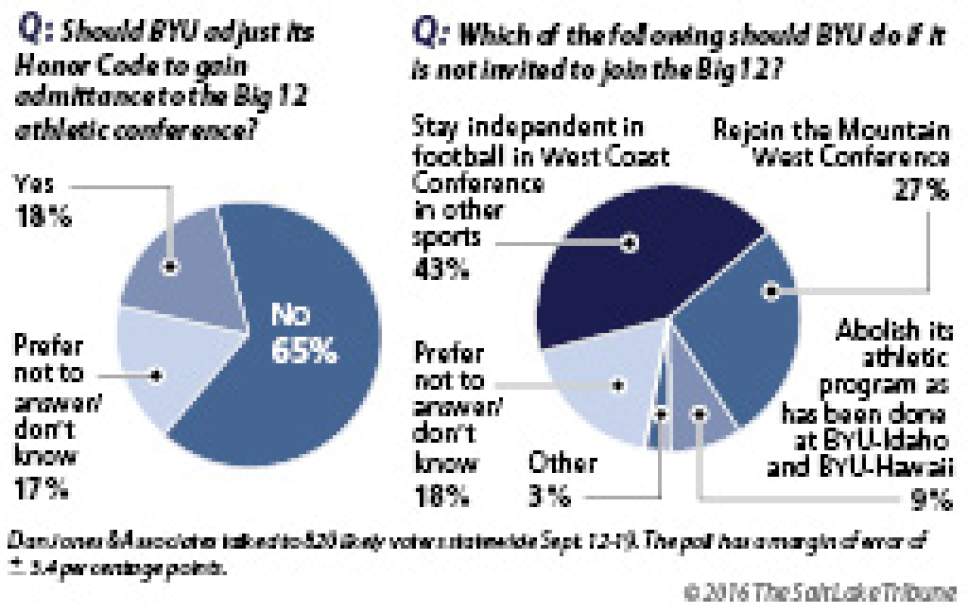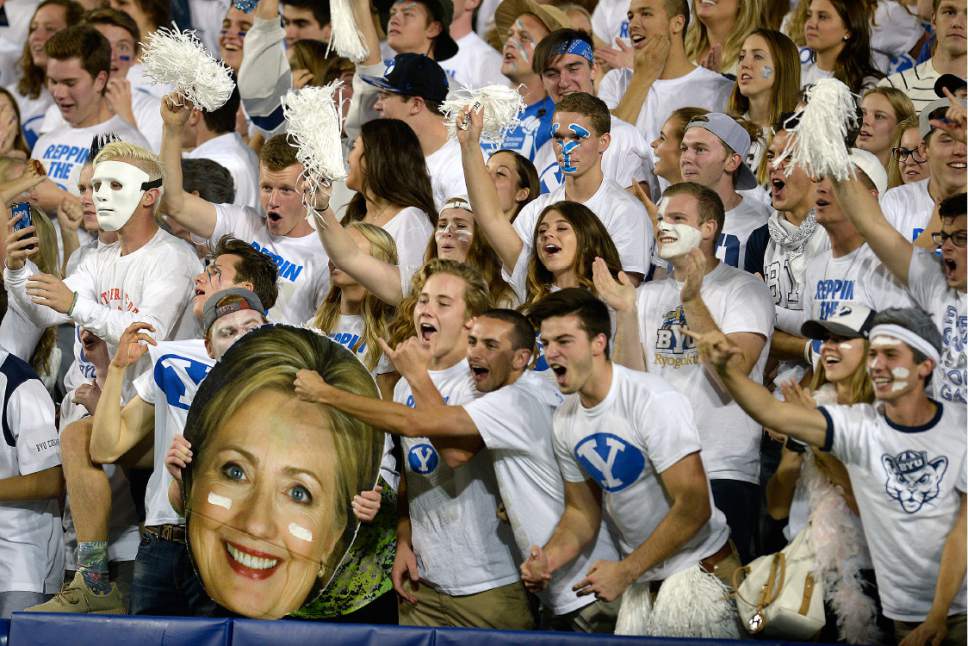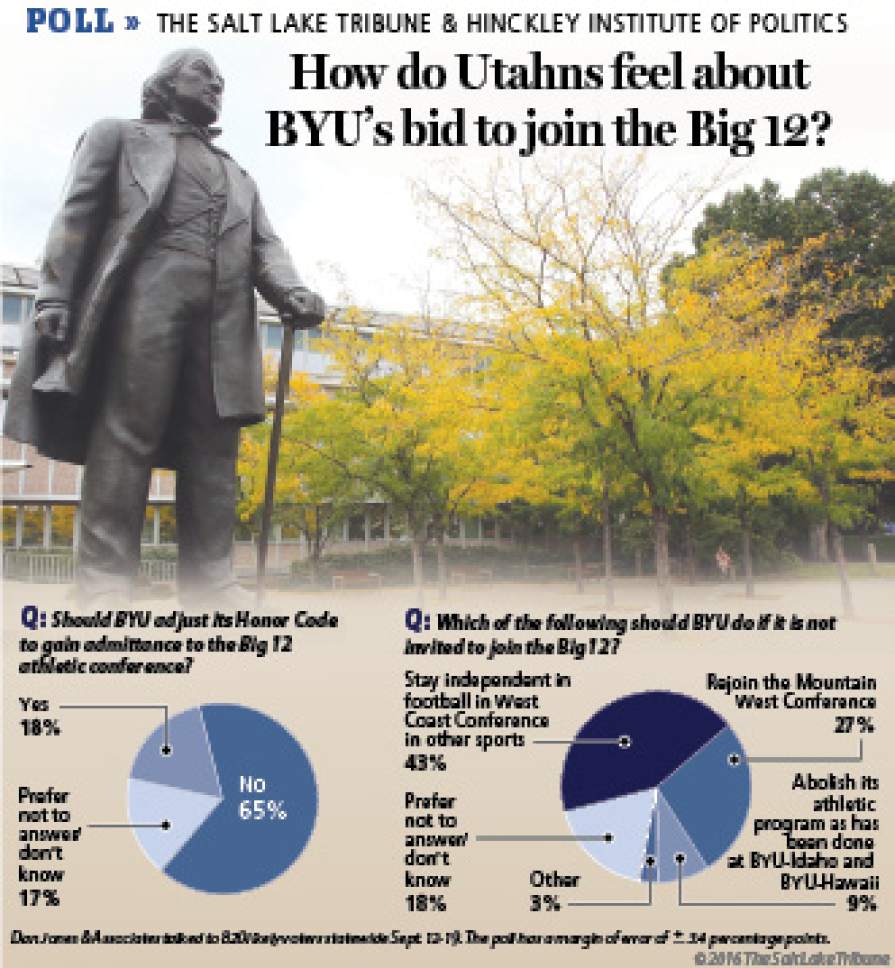This is an archived article that was published on sltrib.com in 2016, and information in the article may be outdated. It is provided only for personal research purposes and may not be reprinted.
Provo • A large majority of Utahns, and an overwhelming majority of members of The Church of Jesus Christ of Latter-day Saints, believe Brigham Young University should not adjust its Honor Code so it can be invited to join the Big 12 Conference — a resistance that could keep one of the West's foremost athletic and academic institutions in a league of its own, expansion observers say.
A mid-September Dan Jones & Associates statewide survey, commissioned by The Salt Lake Tribune and the Hinckley Institute of Politics, also showed that a majority of Utahns believe if the Cougars do not gain admittance into a Power 5 conference, they should remain a college football independent and keep most of their other sports in the West Coast Conference.
The survey of 820 likely voters in November's election asked two questions related to BYU's athletics program.
The first • Should BYU adjust its Honor Code to gain admittance to the Big 12 conference?
The second • What should BYU do with its intercollegiate athletics program if it is not invited to join the Big 12?
In short, 65 percent of the Utahns surveyed said BYU should not adjust its Honor Code. Only 18 percent said BYU should make changes, while 17 percent preferred not to answer, or didn't know.
Regarding the school's athletic future if the Big 12 does not come calling, 43 percent said BYU should maintain the status quo, compared to 27 percent who said it should rejoin the Mountain West Conference and 9 percent who said it should abolish its intercollegiate sports program altogether, like church-owned BYU-Idaho (then Ricks College) did 14 years ago and BYU-Hawaii will do next spring. Twenty-one percent suggested another course of action, did not answer the question, or didn't know.
LDS AGAINST HONOR CODE ADJUSTMENTS
A whopping 83 percent who identified themselves as "very active LDS" said BYU shouldn't relax its honor code. Eighty percent of the LDS respondents overall don't want honor code changes.
Those numbers dishearten, but don't surprise, BYU student Addison Jenkins, president of Understanding Same-Gender Attraction, a group that serves the LGBTQ population at BYU.
"What I have noticed from the vast majority of comments I've seen online, in op-eds, on Twitter, on message boards, is that people just really fundamentally don't understand the difference between BYU's Honor Code and church doctrine," Jenkins said. "BYU's Honor Code has wording in it that diverges from church doctrine on a number of issues."
It is wording that Jenkins, who is LDS, like 99 percent of BYU's 30,000 undergraduate students, would like to see changed.
His experience at BYU has generally been positive and he's found administrators and church leaders willing to listen to his concerns, Jenkins said, but he still believes the code "has language that is harsher, and stricter, for its LGBTQ students."
Currently, "BYU's Honor Code does not live up to the high standard the Big 12 has set regarding non-discrimination of people based on their sexual orientation or gender identity," Jenkins said.
Non-LDS and democrats favor adjustments
The survey found that Catholics (42 percent yes, 30 percent no) and Protestants (32 percent yes, 29 percent no) and those calling themselves "other" in religious-affiliation terms (32 percent yes, 41 percent no) were more likely to advocate for changes to the BYU Honor Code than Mormons.
Of Utahns overall, 68 percent of the men surveyed and 62 percent of the women are against honor code adjustments.
Of those identifying themselves as Republican, 76 percent are against a change, 11 percent in favor. Democrats were 36 percent in favor, 40 percent against, while independents or other political party affiliates were 64 percent against, 19 percent in favor.
Only 50 percent of respondents ages 18-24 said no to adjustments, compared to 71 percent of those 55 and older.
BYU'S HONOR CODE — WHAT'S THE BIG DEAL?
The Honor Code is seen as BYU's biggest obstacle to Big 12 membership, acknowledged Chuck Carlton, who covers Big 12 expansion for the Dallas Morning News.
"It is a big enough [deal] to give some presidents pause," Carlton said. "Combine [Honor Code issues] along with geography and the no Sunday play thing, and presidents are wary. And you need eight [of 10] votes for membership. … A change in the Honor Code wouldn't hurt."
Students and faculty members sign the Honor Code before gaining admission or employment at BYU, but some same-gender attracted students say they didn't fully discover their sexual identity until they were already enrolled.
The clauses that give Jenkins' group heartburn, the ones that he believes should be changed or stricken, say that "homosexual behavior is inappropriate" and define that behavior as "all forms of physical intimacy that give expression to homosexual feelings."
The policy has caused LGBTQ groups across the country to call on the Big 12 to exclude BYU, once seen as a leading candidate, if that P5 conference chooses to expand (which is not a sure thing, Oklahoma president David Boren cautioned last week).
Also, student governments from Iowa State and Kansas State have passed resolutions asking the Big 12 to exclude BYU (although KSU's doesn't specifically mention BYU), because of practices they say discriminate against LGBTQ students and staff.
"Student government protests normally aren't a big deal, but they add to the anti-BYU drumbeat," Carlton concluded, citing last year's uprising at Missouri over the treatment of African-American students that forced the resignation of the school president. "Presidents are probably more leery of student protests now."
The separate paragraphs about homosexual behavior is troubling, Jenkins said, adding: "It is pretty clear that there is a different standard for homosexual and heterosexual behavior at BYU."
WHAT ABOUT BAYLOR?
Baptist-owned Baylor, a Big 12 member, has similar provisions regarding same-gender marriage in its code of conduct, but it was reworded in May of 2015 to drop the phrase "homosexual acts" from the list of conduct that could prompt disciplinary action.
Another issue the Big 12 may or may not have with BYU's Honor Code is that it has allegedly been used by some in the BYU community to suppress the reporting of sexual assaults, as reported by The Salt Lake Tribune. BYU, the University of Utah, Utah State University and Westminster College are among the Utah schools on the list of more than 250 schools nationwide being investigated by the federal government for possible Title IX violations due to the way they have handled sexual assaults on their campuses.
Baylor is also on the list, after an investigation earlier this year uncovered a sexual assault scandal that also led to the dismissal of president Ken Starr and head football coach Art Briles.
"Any comparison to Baylor is not a good thing," Carlton said, noting that he's been told that Big 12 presidents "want to see something tangible and public [from BYU], not just assurances of change."
Carlton believes that Oklahoma's Boren still wants BYU, if it will adjust its Honor Code.
"A change might be an avenue for a compromise," he said. "Boren gets BYU, the Texas schools get Houston. It that a longshot? Probably, but I was told it wasn't out of the realm of possibility."
WHAT'S NEXT?
Largely due to the LGBTQ/Honor Code issue, most national observers believe BYU's candidacy is sinking fast.
If the Big 12 chooses not to expand, or BYU is left out, what happens to an athletic program that has never finished lower than 48th nationally in the overall Learfield Sports Directors Cup standings, and was 30th in the 2015-16 school year?
Maintaining the status quo, which 43 percent recommended in the survey, means staying independent in football and leaving most of its other sports in the West Coast Conference. Fifty-three percent of self-described very active LDS favor the status quo, while 52 percent of Catholics and 44 percent of inactive LDS say BYU should return to the MWC.
Only 6 percent of all LDS respondents say abolishing the athletic program is the way to go, compared to 9 percent of Catholics and 17 percent of people who said they are something other than Mormon, Catholic or Protestant.
Twitter: @drewjay







